People who raise birds and other farm animals are always looking for ways to reduce the cost of feed so that they can make more profit. For example, people who raise turkeys allow their birds to forage for their food.
Even though turkeys do eat a lot of bugs and other little invertebrates, most new-time homesteaders are not sure if they can allow their turkeys to eat seasonal insects such as cicadas or not.
Can turkeys eat cicadas? It is safe and healthy for turkeys to eat cicadas and most other seasonal bugs. Cicadas are safe for consumption and give more proteins to turkeys than some other dietary options of turkeys.
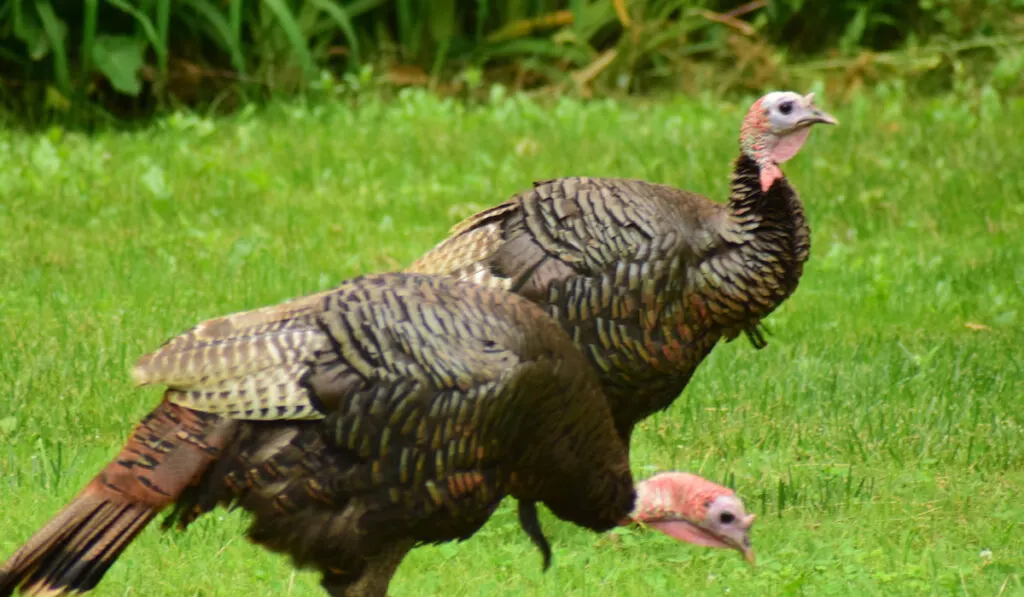
Table of Contents
Nutritional Composition of Cicadas
The table below breaks down the nutrient composition of cicadas:
| Nutrient | Range of Composition (Depending On The Stage Of The Insect) |
| Protein | 20-76% |
| Fat | 2-50% |
| Carbohydrate | 2-50% |
| Fiber | 30-45% |
(Source)
From the table above, you can see that there is a range of values for each nutrient. This range depends on the age or stage of the insect. Protein, for example, is higher in younger cicadas than adults.
Nutritional Needs of Turkeys
When it comes to the growth of animals, the first and major nutrient you should consider is protein. Proteins help your turkeys to grow physically, grow feathers, produce eggs, etc. Proteins also help to grow new and repair damaged tissues.
The table below shows you the protein needs of your turkeys according to their age:
| Age of Turkey | Crude Protein Requirement |
| 0-3 Weeks | 28% |
| 3-6 Weeks | 26% |
| 6-8 Weeks | 26% |
| 8 Weeks > | 22% |
If you compare both tables, you will see that cicadas can give turkeys enough (and even more) proteins that they need. This means that you should not just allow your turkeys to search for cicadas, you can even give more cicadas to your turkeys so that they can grow faster.
Are Cicadas Safe for Turkeys?
Cicadas do not bite nor sting turkeys and they will not transmit diseases to your turkeys nor you. This means that they are completely safe for consumption.
The only difference between cicadas and other bugs that your turkeys might have been eating since is that cicadas are seasonal and not always available.
Other Popular Seasonal Bugs that Turkeys Can Eat
Aside from cicadas, here are some examples of other seasonal bugs that turkeys can eat:
1. June Bugs
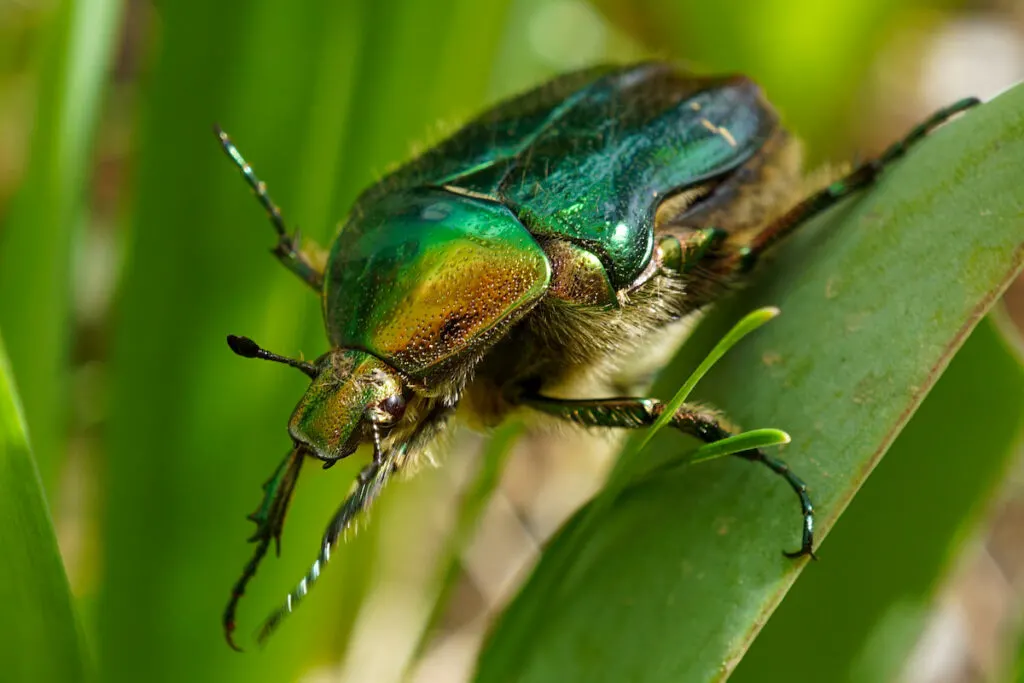
The Green June Beetle (Cotinis nitida) are beetles in the Scarabaeidae family. They have a lifecycle of one year, but the adult mostly appears in June. They are completely safe for turkeys.
2. May Beetles
May Beetles (Phyllophaga spp.) have a lifecycle of about 1 year just like June Bugs, but their adults mostly appear in May.
3. Figeater Beetles
Figeater Beetles (Cotinis mutabilis) are related to June Bugs (they are in the same genus) and have a similar lifecycle (and appearance period).
What Else Do Turkeys Eat?
Here are recommended food ideas for turkeys:
1. Processed Feed
You should give your turkeys feed made for turkeys or gamebirds. Turkey’s processed feed is rich in proteins and other vital nutrients that turkeys need.
One great thing about these feeds is that you can feed your turkeys with them from the day that they hatch until they are big enough and your birds will not lack any nutrients.
Whenever your turkeys have little access to food (i.e. during free-range), give them more processed feed.
2. Grains
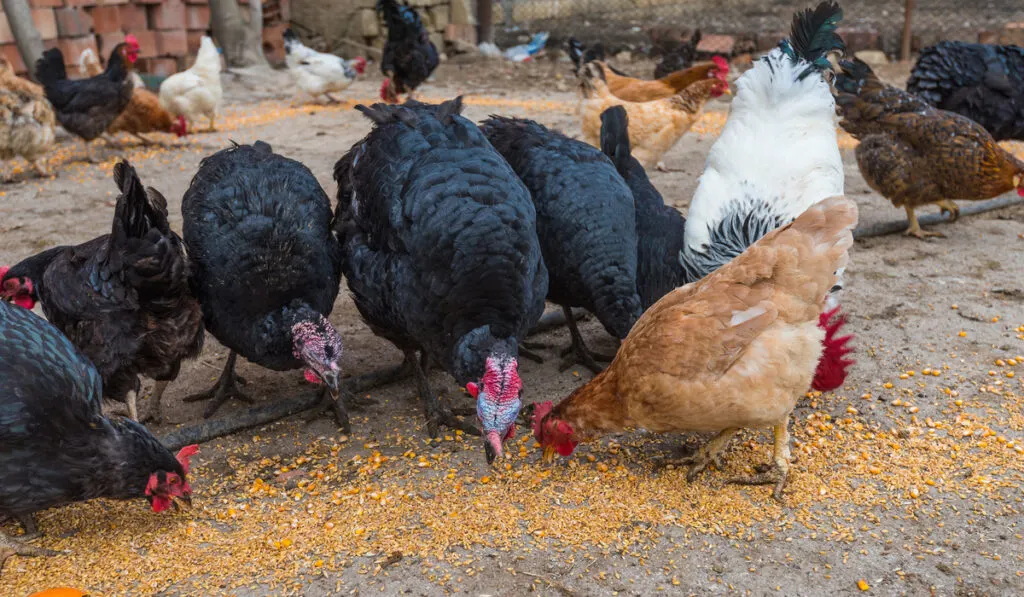
Grains are also great for turkeys. Grains give your birds enough carbohydrates and proteins. What’s more? During the winter, you can feed your turkeys with grains at night. Since digestion causes heat, feeding your birds with grains at night can keep them warmer.
Grains also make great treats for turkeys. You can use grains to reward turkeys when they come back to their coop in the evening.
3. Mealworms and Other Insect Larvae
Insect larvae are very rich in proteins. Mealworms are the larvae of the mealworm beetle.
Mealworms can contain over 50% crude protein, so you should give your turkeys as many mealworms as you can get. You can even cultivate your own.
4. Whatever They Can Find in Free-Range
When you allow your turkeys to forage for their food, they will eat different items such as:
- Seeds
- Young leaves
- Insects
- Spiders
- Earthworms
- Nematodes
- Millipedes
Turkeys can eat a wide variety of foods during free-range.
5. Fruits and Vegetables
Even though they are not a major part of the diet of turkeys, fruits and vegetables give your turkeys just the right amount of vitamins and minerals. Turkeys usually are not selective with their food, so you can give safe seeds, peels, and rinds of your fruits to your turkeys.
You can use vegetables as green piñatas for turkeys. Green piñatas are simply vegetables hung on the roof. Whenever turkeys are bored or hungry, they can peck on their piñata.
Related Questions and Answers
1. What Other Animal Eats Cicadas?
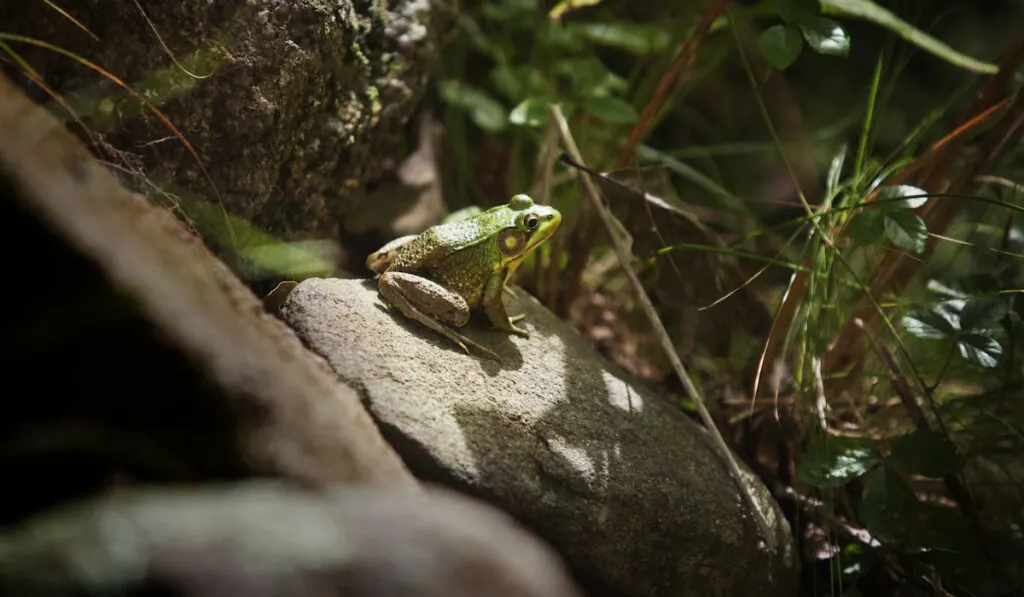
Most omnivorous or insectivorous animal eat cicadas. Omnivorous animals are animals that can eat products from both plants and animals. Insectivorous animals, as the name suggests, are animals that love eating insects.
Aside from turkey, examples of animals that eat cicadas are:
- Squirrels
- Birds
- Frogs
- Lizards and other reptiles
- Hedgehogs
2. Can Baby Turkeys (Poults) Eat Cicadas?
You should only feed your poults with approved meals. During their brooding stage, you should give them starter feed and do not allow them to eat cicadas.
When they are out of the brooder, however, you can give them whatever you want as long as it is safe for them.
3. Can Baby Turkeys (Poults) Get Sick from Eating Cicadas?
Baby turkeys cannot get sick from eating cicadas, but you need to be extra safe when brooding them, so you should give them only approved or recognized feed.
4. Can You Prepare Your Yard or Garden for Cicadas?
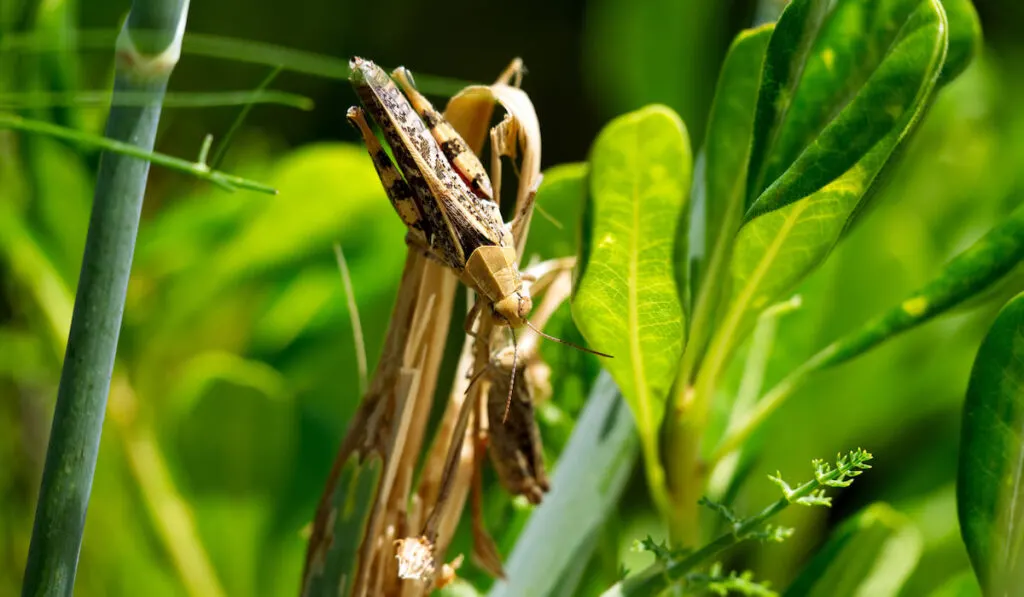
Cicadas are seasonal bugs that appear when they are ready to emerge. This means that they will emerge with or without your preparation. You can make cicadas in your yard more reachable for turkeys by clearing obstacles and making sure that your turkeys have enough space to forage.
5. Why are Cicadas Scarce?
Cicadas aren’t necessarily scarce, they are just seasonal insects. This means that they do not appear all the time. Cicadas, according to the species, can spend 2-17 years underground and only reproduce to breed then die.
This means that if you cannot see cicadas flying around, they are most likely underground living their lives.
Final Thoughts
Turkeys can eat cicadas and it is completely safe for them.
What’s more? Cicadas are full of proteins for your turkeys, so they are an excellent addition to your turkey’s diet. Make sure that you give a balanced diet to your turkeys.
Resources
- https://alifeofheritage.com/farm-living/baby-turkey
- https://www.southernliving.com/garden/pests/cicadas-2021-brood-x-wild-turkey-populations
- https://www.purdue.edu/fnr/extension/billions-of-cicadas-are-coming-this-spring-what-does-that-mean-for-wildlife/
- https://www.thespruce.com/what-do-turkeys-eat-386553
